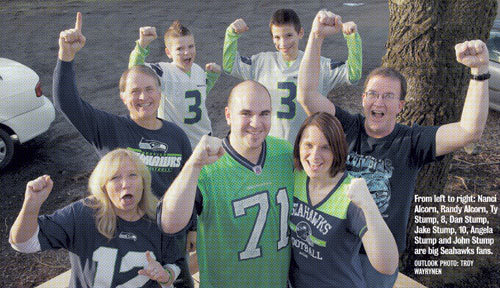Randy Alcorn's Blog, page 169
February 13, 2015
Fifty Shades of Grey: A Dangerous Distortion of God’s Design

There are innumerable pressures put upon us by society, especially through the media, to abandon God’s blueprint for sexual purity. The new movie Fifty Shades of Grey, based on the bestselling book by the same title, is the world’s latest attempt to make appealing and “normal” what God says is sin.
Sadly, many people, possibly including some Christians, will go to watch the movie—and in the process, be amused and entertained by what offends a holy God. Scripture tells us, “To fear the LORD is to hate evil” (Proverbs 8:13) and “sexual immorality and all impurity or covetousness must not even be named among you, as is proper among saints” (Ephesians 5:3)
Part of what makes Fifty Shades of Grey so dangerous is that it twists and distorts God’s design and intentions for sex. Often we fail to understand that the most magnificent gifts of God, taken outside their God-intended boundaries, become utterly ruinous.
Think about two of the most powerful things God has created: fire and water. What would we do without them? But have you ever seen water out of control? Flood, tidal waves, and tsunamis are devastating. Have you ever seen fire out of control—a forest fire or a house burning to the ground? Have you seen somebody’s body covered with burns? It is absolutely horrific. So it is with sex. Its potential for great good has a flip side—potential for great evil.
There’s much more that could be said about the movie and its dangers. But I think Kevin DeYoung sums it up well when he writes in an excellent post, “Some movies do not deserve sophisticated analysis. They deserve sober repudiation. If the church cannot extend grace to sexual sinners, we’ve lost the heart of the gospel. And if we cannot tell people to stay away from 50 Shades of Grey, we’ve lost our minds.”
Of course, some will think I’m overreacting when I say this: Satan is behind this movie. But there you go, I—who do not see the devil behind every bush—believe it, because I have a Christian worldview, and the Bible says, “Be alert and of sober mind. Your enemy the devil prowls around like a roaring lion looking for someone to devour” (1 Peter 5:8). This is a movie that will devour many people, as the book has done, and drag them down into the black hole of immorality.
Am I being an alarmist? I don’t think so, because I’ve seen in people’s lives the utter ruin and devastation that comes from sexual perversity. Fifty Shades of Grey wasn’t the first, nor will it be the last strategy from the pit of hell. But make no mistake, that’s where it’s from. I’m especially sad that many young people will be dragged down with this in the “read it/see it because it’s cool” culture.
If you’d like to do some more reading about how to dialogue with others about the movie and book, I recommend these resources:
Fifty Shades of Nay: Sin Is a Needle, Not a Toy, by Marshall Segal with Desiring God
Five myths about Fifty Shades of Grey, by Emily Whitten with WORLD Magazine
7 Lessons from Fifty Shades of Grey, by Tim Challies and Helen Thorne

Each blog regularly appears on my Facebook page. If you’d like to comment or see others’ comments, we invite you to join us there.
February 11, 2015
The Sin of Gluttony, and a Reminder of What We Really Hunger for

A problem seldom addressed in Western churches is gluttony. Whether you are fat or skinny, God’s Word tells us that gluttony—eating too much—is a sin (Proverbs 23:2, 20, 21; Philippians 3:19).
In this blog, I’ve included an answer from John Piper in which he provides some insight into dealing with this sin in our own lives. As John notes, Scripture often describes our longing for God as a deep hunger or thirst. Hunger and thirst are basic drives in our bodies, and there is also a hunger and thirst of the soul. This fallen world, including food and drink, can never ultimately and fully satisfy our fallen selves. But we keep going back to it, as if it can. We set our sights on the objects of a thousand different desires, none of which give us the lasting pleasure we long for.
Scripture reminds us that Christ is what we really crave, and what alone will satisfy our deepest hunger: “How priceless is your unfailing love! Both high and low among men find refuge in the shadow of your wings. They feast on the abundance of your house: you give drink from your river of delights. For with you is the fountain of life; in your light we see light” (Psalm 36:7-9).
Here’s what John has to say:
How can I conquer gluttony?
There are a lot of reasons for obesity in our culture. It's not just that we eat a lot of bad food. We're also pretty inactive and don't do a lot of walking, running, biking, etc. Oftentimes obesity issues are connected as much to activity issues as they are to what goes into our mouths. Muscles are designed to burn food, but if they aren't being used then any amount of food is going to result in obesity.
But "gluttony" is a better word to use in this context rather than "obesity," because overeating is where the problem is, not how much you weigh. There are all kinds of reasons why a person might weigh too much or too little that is not a result of gluttony.
Gluttony is having a craving for food that conquers you.
The text of Scripture that holds out the challenge to me on this issue is 1 Corinthians 6:12 where Paul says—specifically in regard to food and drink—that he will not be enslaved by anything. He is saying, "I have one master, Jesus Christ, and I don't want any other master." Then in 9:27 he talks about pummeling his body: "I pummel my body lest I be disqualified."
I think we need to recover a large appreciation for the biblical disciplines of self-denial and fasting. That is the discipline side of this issue: "I will not be enslaved by anything," "I pommel myself," and "I take up my cross daily." I think we should esteem, extol, and cherish the biblical teaching that the Christian life is one of confronting our cravings and saying no to them.
But easier said than done, right?
So how do you fight the battle? I think it must be fought mainly not with the word "No" but with an alternative "Yes."
Read the rest of John’s article.

Each blog regularly appears on my Facebook page. If you’d like to comment or see others’ comments, we invite you to join us there.
photo credit: Paella should be a great Birthday Dinner, isn't it? via photopin (license) cropped
February 9, 2015
How (and How Not) to Think about the Trinity

In his book Delighting in the Trinity, Michael Reeves writes, “The Trinity is the governing center of all Christian belief, the truth that shapes and beautifies all others. The Trinity is the cockpit of all Christian thinking.”
As such, it’s a doctrine well worth contemplating, even if we can’t fully understand it. (It’s very possible to say “huh?” to the mysterious mathematics of the Trinity, yet appreciate its inexplicable wonders!)
In this video, EPM’s Julia Stager does a great job talking about some trinitarian heresies, including modalism, partialism and subordinationism, and also explains what the Bible actually affirms about the Trinity. Here’s a lot of good theology in 3.5 minutes:
If you’d like to watch more of Julia’s videos, you can subscribe to her YouTube channel: Crossover.

Each blog regularly appears on my Facebook page. If you’d like to comment or see others’ comments, we invite you to join us there.
photo credit: View from the fighter pilot office via photopin (license)
February 6, 2015
Counter Culture by David Platt

David Platt’s new book Counter Culture: A Compassionate Call to Counter Culture in a World of Poverty, Same-Sex Marriage, Racism, Sex Slavery, Immigration, Abortion, Persecution, Orphans and Pornography was released this week. David Burnett says it’s “a call for Christians to respond to many of the critical social issues of our day with gospel compassion, conviction, and courage.”
David Platt writes, “On popular issues like poverty and slavery, where Christians are likely to be applauded for our social action, we are quick to stand up and speak out. Yet on controversial issues like homosexuality and abortion, where Christians are likely to be criticized for our involvement, we are content to sit down and stay quiet.”
Here’s more about the book:
Ask a group of Christians what they think about poverty, sex trafficking, or the orphan crisis, and you’ll probably get a pretty quick response. But ask that same group about gay marriage or abortion, and you’ll most likely be faced with a lot of nervous hesitancy or fuzzy answers. In this day when social issues are creating clear dividing lines in society, moral or political neutrality is no longer an option for those who believe the gospel. It’s simply not enough to focus on only those issues that are most comfortable—and least costly—to us.
But what if the main issue is not poverty or homosexuality or abortion? What if the main issue is God? What if the same God who moves us to war against sex trafficking also moves us to war against sexual immorality? What if the same gospel that compels us to combat poverty also compels us to defend traditional marriage? What if all of these cultural hot-button issues are all connected to our understanding of who God is and how he relates to everything around us? Join David Platt as he invites us to fix our gaze on the holiness, love, goodness, truth, justice, authority, and mercy of God revealed in the gospel and to walk boldly right into the middle of today’s culture wars.
 I’m grateful for David Platt and voices like his, who are calling the church to be faithful to God’s Word and extend both the grace and truth of Jesus in the midst of an increasingly hostile culture.
I’m grateful for David Platt and voices like his, who are calling the church to be faithful to God’s Word and extend both the grace and truth of Jesus in the midst of an increasingly hostile culture.
True Christians do not mindlessly parrot whatever society happens to be saying (or what their own favorite group prefers). They go back to the Scriptures to see what God says, and they believe it even when it’s unpopular. They realize that one day they’ll stand before Christ, the Judge of All, and in that day God’s position on these issues will be the standard by which all others are judged.
Martin Luther King, Jr., like many leaders, had his flaws. Yet he saw social evils with unusual insight and faced them with uncommon courage. He said, “Cowardice asks the question: is it safe? Expediency asks the question: is it politic? Vanity asks the question: is it popular? But conscience asks the question: is it right? And there comes a time when one must take a position that is neither safe, nor politic, nor popular—but one must take it simply because it is right.”
The Bible commands us to do what is right not only when convenient, but when costly.
God has called us to be His children and ambassadors, not His speech writers or PR team attempting to airbrush His image so His polling will go up. We’ve become accustomed to pleasing ourselves, and pleasing others, whether that’s our culture or our Christian subculture. But Scripture teaches we should seek to please God, the Audience of One. We should live for His applause, His “Well done,” not for the approval of others.
If we fail to speak the truth in love—either by not speaking the truth or not doing it in love—we fail to represent God (Ephesians 4:15). If we choose between grace and truth we misrepresent Jesus, who is full of both grace and truth (John 1:14).
How can you believe, when you receive glory from one another and do not seek the glory that comes from the only God? —Jesus, John 5:44
For am I now seeking the approval of man, or of God? Or am I trying to please man? If I were still trying to please man, I would not be a servant of Christ. —Paul, Galatians 1:10

Each blog regularly appears on my Facebook page. If you’d like to comment or see others’ comments, we invite you to join us there.
February 4, 2015
Perspectives That Are All the More Significant When You Lose

I wrote this on Facebook Sunday night, but I thought it appropriate to share today.
“Whoever trusts in the LORD, happy is he” (Proverbs 16:20).
This is why I can be happy in Jesus tonight even though my favorite team lost the Super Bowl in the final moments. :) I mean this with all my heart. He remains sovereign and loving and purposeful even when in minor things (like the Super Bowl) or in major ones, He has designs other than the ones I wished for—according to "the purpose of him who works all things according to the counsel of his will" (Ephesians 1:11). One day we’ll see in retrospect that He has worked all things together—among the least of them being sports outcomes—for our good (Romans 8:28). May God give us the grace to believe today what we’ll one day know to have been true all along. Not just in the small things, but in the things in our lives far bigger than a Super Bowl. :) (That's me and Nanci, along with our daughter Angela and her family and her father-in-law and our friend John Stump, in the photo, which appeared on the front page of the Gresham Outlook newspaper before the game. Especially fun to see our grandsons Jake and Ty interviewed and then quoted in the article!)
Disappointment is human and understandable, and I don’t minimize it, but I want to maximize the “good news of great joy” in Jesus Christ. That’s not limited to fans of one of 32 teams, or to one person in three, but is always available not only to the whole world, but to each of us who know Jesus, since we all need a daily and hourly infusion of His supernatural grace.
I encourage you to watch the following video featuring some Christ-followers I really appreciate, some of whom I know personally. If the men in this video had won the Super Bowl, as they did last year, I think their words might be taken as health and wealth gospel—“We’ve won the big game, so you should listen to us.” No, they LOST the big game on Sunday, but what they share remains 100% true. We usually feel the need for God more when we deal with our losses than when we celebrate our gains. Therefore what they have to say is if anything more significant, not less.

Each blog regularly appears on my Facebook page. If you’d like to comment or see others’ comments, we invite you to join us there.
photo credit: Troy Wayrynen for the Gresham Outlook
February 2, 2015
Some Thoughts for Those Who Are Considering Divorce

I do not stand in judgment of those who’ve been divorced, and I know many people whose divorces were either outside their control, or were made necessary by continued abuse and unfaithfulness. This is NOT an attack piece on the divorced. It is written for the many believers who may be considering a divorce too soon because it is a cultural norm. Please don’t feel judged, but this is to help some people even though it may be of no help to you.
1. Trust the Lord, don’t trust yourself. Relationships can cause hurt, and hurt people find it hard to think straight. God knows all, sees all, and works everything together for your good. Trust in the Lord and what He says in his Word.
“Trust in the LORD with all your heart and lean not on your own understanding; in all your ways submit to him, and he will make your paths straight.” (Proverbs 3:5-6)
“And we know that in all things God works for the good of those who love him, who have been called according to his purpose. For those God foreknew he also predestined to be conformed to the image of his Son.” (Romans 8:28-29)
2. Realize that the answer to suffering is not always to move away from it. God sometimes calls us to follow Him by walking into or remaining under suffering.
“Then Jesus said to them all: ‘Whoever wants to be my disciple must deny themselves and take up their cross daily and follow me.’” (Luke 9:23)
“Dear friends, do not be surprised at the fiery ordeal that has come on you to test you, as though something strange were happening to you. But rejoice inasmuch as you participate in the sufferings of Christ, so that you may be overjoyed when his glory is revealed. …If you suffer, it should not be as a murderer or thief or any other kind of criminal, or even as a meddler. However, if you suffer as a Christian, do not be ashamed, but praise God that you bear that name.” (1 Peter 4:12-16)
3. Contemplate that God is accomplishing a purpose in your sufferings.
“Not only so, but we also glory in our sufferings, because we know that suffering produces perseverance; perseverance, character; and character, hope.” (Romans 5:3-4)
“Our present sufferings are not worth comparing with the glory that will be revealed in us.” (Romans 8:18)
“For our light and momentary troubles are achieving for us an eternal glory that far outweighs them all.” (2 Corinthians 4:17)
4. Wait on the Lord. Don’t act hastily. Keep doors open. Only close the doors that you are certain God says you should close.
“Wait for the LORD; be strong and take heart and wait for the LORD.” (Psalm 27:14)
“Do you not know? Have you not heard? The Lord is the everlasting God, the Creator of the ends of the earth. He will not grow tired or weary, and his understanding no one can fathom. He gives strength to the weary and increases the power of the weak. Even youths grow tired and weary, and young men stumble and fall; but those who hope in the Lord will renew their strength. They will soar on wings like eagles; they will run and not grow weary, they will walk and not be faint.” (Isaiah 40:28-31)
5. Don’t just trust that God can change someone else’s heart. Trust that He can change and renew your heart.
“I will give you a new heart and put a new spirit in you; I will remove from you your heart of stone and give you a heart of flesh.” (Ezekiel 36:26)
“Therefore we do not lose heart. Though outwardly we are wasting away, yet inwardly we are being renewed day by day.” (2 Corinthians 4:16)
6. Meditate on Scripture related to the issue of marriage, separation and divorce.
Jesus: “It has been said, ‘Anyone who divorces his wife must give her a certificate of divorce.’ But I tell you that anyone who divorces his wife, except for marital unfaithfulness, causes her to become an adulteress, and anyone who marries the divorced woman commits adultery.” (Matthew 5:31-32)
“Some Pharisees came to him to test Jesus. They asked, ‘Is it lawful for a man to divorce his wife for any and every reason?’ ‘Haven’t you read,’ he replied, ‘that at the beginning the Creator “made them male and female,” and said, “For this reason a man will leave his father and mother and be united to his wife, and the two will become one flesh”? So they are no longer two, but one. Therefore what God has joined together, let man not separate.’ ‘Why then,’ they asked, ‘did Moses command that a man give his wife a certificate of divorce and send her away?’ Jesus replied, ‘Moses permitted you to divorce your wives because your hearts were hard. But it was not this way from the beginning. I tell you that anyone who divorces his wife, except for marital unfaithfulness, and marries another woman commits adultery.’” (Matthew 19:3-9)
Jesus: “But at the beginning of creation God ‘made them male and female.’ ‘For this reason a man will leave his father and mother and be united to his wife, and the two will become one flesh.’ So they are no longer two, but one. Therefore what God has joined together, let man not separate.” (Mark 10:6-9)
“Jesus answered, ‘Anyone who divorces his wife and marries another woman commits adultery against her. And if she divorces her husband and marries another man, she commits adultery.’” (Mark 10:11-12)
Jesus: “Anyone who divorces his wife and marries another woman commits adultery, and the man who marries a divorced woman commits adultery.” (Luke 16:18)
“...by law a married woman is bound to her husband as long as he is alive, but if her husband dies, she is released from the law of marriage. So then, if she marries another man while her husband is still alive, she is called an adulteress. But if her husband dies, she is released from that law and is not an adulteress, even though she marries another man.” (Romans 7:2-3)
“A wife must not separate from her husband. But if she does, she must remain unmarried or else be reconciled to her husband. And a husband must not divorce his wife. …If any brother has a wife who is not a believer and she is willing to live with him, he must not divorce her. And if a woman has a husband who is not a believer and he is willing to live with her, she must not divorce him ... [15-16] But if the unbeliever leaves, let him do so. A believing man or woman is not bound in such circumstances; God has called us to live in peace. How do you know, wife, whether you will save your husband? Or, how do you know, husband, whether you will save your wife?.... [27] Are you married? Do not seek a divorce. Are you unmarried? Do not look for a wife ... [39] A woman is bound to her husband as long as he lives. But if her husband dies, she is free to marry anyone she wishes, but he must belong to the Lord.” (1 Corinthians 7:10-13, 15-16, 27, 39)
“‘I hate divorce,’ says the LORD God of Israel.” (Malachi 2:16)
7. Whatever actions you consider taking, ask whether you can take that action for the glory of God.
“So whether you eat or drink or whatever you do, do it all for the glory of God.” (1 Corinthians 10:31)
Can you be separated but not pursue a divorce, wait on the Lord, and remain open to the possibility of reconciliation, and do this to the glory of God?
Can you pursue a divorce to the glory of God?
8. Whatever actions you consider taking, ask whether you can take that action in the name of the Lord Jesus.
“And whatever you do, whether in word or deed, do it all in the name of the Lord Jesus, giving thanks to God the Father through him.” (Colossians 3:17)
Can you be separated but not pursue a divorce, wait on the Lord and remain open to the possibility of reconciliation, and do this in the name of the Lord Jesus?
Can you pursue a divorce in the name of the Lord Jesus?
9. Whatever action you take, ask yourself if you can take it in keeping with a renewed and transformed mind, and not in conformity to the pattern of the world.
“Therefore, I urge you, brothers and sisters, in view of God’s mercy, to offer your bodies as a living sacrifice, holy and pleasing to God—this is your true and proper worship. Do not conform to the pattern of this world, but be transformed by the renewing of your mind. Then you will be able to test and approve what God’s will is—his good, pleasing and perfect will.” (Romans 12:1-2)
Can you be separated but not pursue a divorce, wait on the Lord and do so with a renewed and transformed mind, acting not in conformity to the world’s pattern?
Can you pursue a divorce with a renewed and transformed mind, acting not in conformity to the world’s pattern?
10. Whatever action you take, ask yourself if you can take it in keeping with the grace and truth of Jesus.
“For the law was given through Moses; grace and truth came through Jesus Christ.” (John 1:17)
Can you be separated but not pursue a divorce, wait on the Lord and remain open to the possibility of reconciliation, and do so in keeping with the grace and truth of Jesus?
Can you pursue a divorce and do so in keeping with the grace and truth of Jesus?
11. Whatever action you consider, ask yourself if it can be done while bearing the fruit of God’s Spirit.
“But the fruit of the Spirit is love, joy, peace, forbearance, kindness, goodness, faithfulness, gentleness and self-control. Against such things there is no law. Those who belong to Christ Jesus have crucified the flesh with its passions and desires. Since we live by the Spirit, let us keep in step with the Spirit.” (Galatians 5:22-25)

Each blog regularly appears on my Facebook page. If you’d like to comment or see others’ comments, we invite you to join us there.
January 30, 2015
The Misery of Many Lottery Winners: Proof Money Can’t Buy Happiness

While many people may believe the statement “money can’t buy happiness,” nearly everyone would like to put that theory to test! People will almost always believe wholeheartedly that they would become immensely happy if only they had more money.
As I write this, 130,000 Powerball tickets are being sold each minute. And though they know their chances of winning are remote, gamblers stake their hopes on them. Yet the track record of happiness for lottery winners is shocking.
After a group of co-workers won $450 million in 2013, Willie Seeley took the microphone at a press conference. Beaming, he said, “We are very happy, happy, happy.” He and his wife appeared on NBC’s TODAY show, where he said he was going to fish, hunt and do as he pleased.
When I saw the video six months after it happened, I thought, “I wonder how long that lasted?” I’d read too many stories to believe the happiness would hold.
After only two months Willie and his wife were already full of regrets. He said, “There are days I wish we were back to just getting paid every two weeks. You have to change your whole way of life, but we didn’t want to change the way we lived.”
His wife Donna called their winnings “the curse.” Feeling sorry for the new winner of a $400 million lottery, Willie said, “He doesn’t understand…The drama is nonstop.”
I realize people’s experiences differ. But it is fair to say that over the long-haul, people’s personal happiness is rarely raised by winning the lottery:
Charles Riddle won a big early lottery in 1975. After getting divorced quickly and facing several lawsuits, he was arrested for selling cocaine.
William “Bud” Post won $16.2 million in 1988. He was sued by a former girlfriend who wanted the money, and his brother hired a hit man, hoping to murder him and inherit it. He was $1 million in debt in a year and later went to jail for shooting a gun over a bill collector’s head. Post called winning the money a “nightmare.” He died in 2006 after declaring bankruptcy.
Jeffrey Dampier won $20 million in 1996. Dampier bought homes for relatives. Several years later, a sister-in-law and her boyfriend kidnapped and murdered him for the money.
John McGuiness won £10 million in 1997. He bought luxury cars and went on vacations, then lost all his money, went back to work and applied for subsidized housing. McGuiness commented, “I just want my life to get back to the way it was before.”
Billie Bob Harrell, Jr. won $31 million in 1997. Harrell used the money to purchase a ranch, homes and cars for himself and family members. His spending and lending spiraled out of control. Harrell divorced, and just 20 months after winning the money, he committed suicide using a shotgun.
Victoria Zell won $11 million in 2001. Zell landed in prison after a drug- and alcohol-induced collision that paralyzed one person and killed another.
Jack Whittaker won $315 million in 2002. After winning, his life involved arrests, shattered relationships, lawsuits, and the death of loved ones. Whittaker later said he wished he had “torn up the ticket.”
Callie Rogers won $3 million in 2003. Sixteen-year-old Rogers spent the money on fancy cars, gifts, lavish vacations, and plastic surgery. An ex-boyfriend got her hooked on cocaine, a habit she spent hundreds of thousands of dollars on, and she attempted suicide twice.
Keith Gough won £9 million in 2005. He bought racehorses, divorced his wife, was conned by a girlfriend, became an alcoholic, developed cirrhosis of the liver and died in 2010. He told a newspaper before his death, “My life was brilliant but the Lottery ruined everything. …What’s the point of having money when it sends you to bed crying?”
Abraham Shakespeare won $31 million in 2006. Shakespeare went missing in 2009 after spending most of the money. A few months later, his body was found under a slab of concrete.
To put perspective on these stories, we should realize that many people dream of winning the lottery because they feel certain it would bring them lasting happiness. As long as they don’t win, hope remains. But once they do win and still don’t find happiness, their hope is gone.
As a bumper sticker says, “The lottery is a tax on people who are bad at math.” The chances are greater of being struck by lightning than of winning a multimillion-dollar lottery. But even if someone ends up winning, the gambler has violated God’s means of provision. It’s hard and wise labor that brings financial profit (Proverbs 14:23). Even then, reality is that money and material possessions can never satisfy the deepest longings of our hearts.
God is jealous of our affections, demanding that He alone be the focus of our worship (Exodus 20:3-5). Scripture tells us to put our hope in God (Psalm 42:5, 11). God tells us to work for a living, not play the odds and seek shortcuts to wealth (Proverbs 28:19-20). God is sufficient to supply all our needs (Philippians 4:19). Scripture warns us against covetousness (Deuteronomy 5:21) and calls us to contentment (Philippians 4:11-12).
May we remember that ultimate satisfaction can only be found in God, the gracious giver of all good things. We were made for Him and we will never be satisfied with less.

Each blog regularly appears on my Facebook page. If you’d like to comment or see others’ comments, we invite you to join us there.
photo credit: Jennuine Captures via photopin cc
January 28, 2015
Response to a Blind Reader Struggling with Pornography

Here at Eternal Perspective Ministries we receive numerous questions and comments from readers. Sometimes a tough question comes through that requires a longer and more in-depth response from a staff member or volunteer, as in this case. If you or someone you care about is struggling with pornography, I encourage you to read through this excellent letter from an EPM volunteer whom I love and respect.
EPM reader:I'm in some pretty serious trouble, and am not at all sure how to fix it.
I have only been a Christian for a few months, and it's been a life-changing experience. It's just amazing to be one of His servants and to be saved by God's grace and Christ's sacrifice.
The problem is this: I struggle with internet-based pornography. I know the normal thing to do would be to get rid of the computer entirely, or at the very least get internet service disconnected or install controls on my computer.
The problem is that I am totally blind. I don't even have light perception. So I have a couple of problems. One is that I'm not looking at images at all, though I do listen to videos sometimes. Mostly what I do is read stories though.
I was never taught anything about sex, and learned every bit of what I know from pornography. I started by forming the wrong pathways, and am now having to pray and ask God to help me rewire them, to give me the power to resist temptation. Inevitably though, it seems I end up giving into it, and then I have to ask for forgiveness all over again.
The problem with getting rid of my technology is that, being blind, it's basically how I access the world. Without my computer and phone, I cannot read the majority of books, can't read money, can’t use my phone to find out where I am when I'm walking alone, and many other things, not the least of which is read the Bible.
I have tried installing controls on our connection and giving the password to my wife. But even when the controls are active, I can always use my phone's hot spot and data plan to access the unprotected internet if I want to. I seem to enjoy finding ways around the controls, no matter how many of them I have my wife put in place.
I don't know what I would do without technology to assist me in my daily life as a blind person. I think I would feel crippled. I wish I could go back to those three months as a new believer when this wasn't an issue, when I was quite literally on a spiritual high.
Volunteer’s response:Thanks for your letter and for expressing a desire to go back to those three months of “spiritual high” you enjoyed as a new believer when the temptation to lust wasn’t an issue. I can see you have tasted the true pleasure of being close to Jesus. There’s nothing like it and all the so-called pleasures of this world pale in comparison.
I can identify with you in many ways because I struggled for most my life with looking at porn. I’ve been freed up from that for the last 10 years and now the Lord is working on many other areas of my life to help me be close to Him and bring glory to Him. I know He can do that for you too.
One biblical principle I think applies comes from the words of Jesus. He said “If your right hand makes you stumble, cut it off and throw it from you” (Matthew 5:30). You say, “I don't know what I would do without technology to assist me in my daily life as a blind person. I think I would feel crippled.” It would be like cutting off your hand, wouldn’t it? To be without a hand is crippling but Jesus says there are more important things than hands.
In my case I lost my job because I was looking at porn where I worked. I shamed myself, my wife, my family and friends. The Lord brought me low, truly to the end of my rope. I always wanted to stop but never seemed to be able to until I was publicly disgraced and got serious about where I was as a believer in Jesus.
It wasn’t until I was broken that I was motivated to do something. I got into an accountability group at a church in our area where we met weekly. I did some of the things you did with passwords controlled by my wife. Every time I wanted to use the computer I had to ask my wife to log me in and I would only access the computer when she was there.
One thing that really helped me was I found an excellent counselor. In our first session he asked me what part of looking at porn goes with being a follower of Jesus. I said absolutely no part. Then he said, “We need to find out why you do things you don’t want to do.” So we started the hard work of looking at the why. I’m still tempted to lust and fantasize but I don’t get into porn anymore even though I’m on the computer alone now with no password blocks.
In your case you have a unique situation. You say, “I seem to enjoy finding ways around the controls.” The Lord God has placed a major control in your life by eliminating your sight. So you literally can’t look after a woman to lust after her. However, you have found a way to get around even that control.
Here are a few suggestions:
Find a pastor or accountability group of believing men you can meet with weekly.
Consider “cutting off the hand” that leads you to stumble. Get rid of devices which make it easy to sin: computer, phone, games, etc. They aren’t necessities. You can still get the Bible and good books on CDs. I’m sure you can use your cleverness to help figure out ways to fill your life with good things.
Find a counselor with experience in this area. A good counselor can be worth his weight in gold but a poor one won’t help much. Work hard at finding out why you would do things you don’t want to do.
Seek the Lord with everything in you. I get up every morning and, after brewing a cup of coffee, spend time in the Word. I ask God to show me what He is like. And I invite Him to be in every part of my life. And when I sin I go right back to Him. Two of my favorite verses are:Psalm 51:3 “…my sin is always before me.”
Romans 8:1 “…There is now no condemnation for those who are in Christ Jesus.”
I hope some of this is helpful. I will pray that down the road you will be able to say with Fanny Crosby, the blind hymn writer:
Perfect submission, all is at rest
I in my Savior am happy and blest,
Watching and waiting, looking above,
Filled with His goodness, lost in His love.

Each blog regularly appears on my Facebook page. If you’d like to comment or see others’ comments, we invite you to join us there.
January 26, 2015
Comfort, Hope and Encouragement from God

Some days no one but God has the right words. Nothing I can say stacks up against what follows. Read, believe and thank God that even when we don’t sense His presence, He’s with us and at work in a thousand ways we can’t see. But our failure to see is not the same as His failing to be present and to be working together all things for our good (Romans 8:28).
I suggest you read each of these verses aloud. Or, stop on one that really speaks to you and read and reread it aloud. Meditate on it, memorize it, and let God speak to your heart as only He can. These are the very words of God. Shut out all the rest of the voices in the world—TV, radio, magazines, books, internet, email, social media—and listen to His voice alone.
Read the passages that follow in light of this first one, and listen for the voice of God in all of them:
Jesus said, “My sheep recognize my voice; I know them, and they follow me. I give them eternal life, and they will never perish. No one will snatch them away from me, for my Father has given them to me, and he is more powerful than anyone else. So no one can take them from me. The Father and I are one." (John 10:27-30, NLT).
Surely God is my salvation; I will trust and not be afraid. The LORD, the LORD himself, is my strength and my defense; he has become my salvation. (Isaiah 12:2)
Shout for joy, you heavens; rejoice, you earth; burst into song, you mountains! For the LORD comforts his people and will have compassion on his afflicted ones. (Isaiah 49:13)
"Do not be afraid of them, for I am with you and will rescue you," declares the LORD. (Jeremiah 1:8)
The LORD is good to those whose hope is in him, to the one who seeks him. (Lamentations 3:25)
But as for me, I watch in hope for the LORD, I wait for God my Savior; my God will hear me. (Micah 7:7)
[Jesus said] Blessed are those who mourn, for they will be comforted. (Matthew 5:4)
[Jesus said] Indeed, the very hairs of your head are all numbered. Don't be afraid; you are worth more than many sparrows. (Luke 12:7)
[Jesus said] Peace I leave with you; my peace I give you. I do not give to you as the world gives. Do not let your hearts be troubled and do not be afraid. (John 14:27)
May the God of hope fill you with all joy and peace as you trust in him, so that you may overflow with hope by the power of the Holy Spirit. (Romans 15:13)
Praise be to the God and Father of our Lord Jesus Christ, the Father of compassion and the God of all comfort, who comforts us in all our troubles, so that we can comfort those in any trouble with the comfort we ourselves receive from God. (2 Corinthians 1:3-4)
God has said, “Never will I leave you; never will I forsake you.” So we say with confidence, "The Lord is my helper; I will not be afraid. What can mere mortals do to me?" (Hebrews 13:5-6)
What then shall we say to these things? If God is for us, who can be against us? (Romans 8:31)
In all these things we are more than conquerors through him who loved us. For I am convinced that neither death nor life, neither angels nor demons, neither the present nor the future, nor any powers, neither height nor depth, nor anything else in all creation, will be able to separate us from the love of God that is in Christ Jesus our Lord. (Romans 8:37-39).

Each blog regularly appears on my Facebook page. If you’d like to comment or see others’ comments, we invite you to join us there.
photo credit: Chiot's Run via photopin cc (cropped)
January 23, 2015
The Thrill of Seeing Christ Face-to-Face

One day in Heaven, we will see Christ in His glory. The most exhilarating experiences on Earth, such as white-water rafting, skydiving, or extreme sports, will seem tame compared to the thrill of seeing Jesus. Being with Him. Gazing at Him. Talking with Him. Worshiping Him. Embracing Him. Eating with Him. Walking with Him. Laughing with Him. Imagine it!
In my novel Dominion, I picture one of the characters, Dani, seeing Christ as she enters Heaven:
At the doorway into life stood a shining being of natural radiance, but with the brightness of a million klieg lights. The radiance threatened to blind her, but somehow her new eyes could endure it. This was more than a man, yet clearly a man. She knew at once who it was. He who had been from eternity past, He who had left His home in heaven to make one here for her. He who spun the galaxies into being with a single snap of his fingers, who was the light that illumined darkness with a million colors, who turned midnight into sunrise...
“Welcome, my little one!” He smiled broadly, the smile teeming with approval. “Well done, my good and faithful servant. Enter into the kingdom prepared for you. Enter into the joy of your Lord!”
He hugged her tight and she hugged him back, clutching on to His back, then grasping His shoulders. She didn’t know how long it lasted. These same arms had hugged her before, somehow—she recognized their character and strength—but she enjoyed the embrace now as she’d never dreamed she could enjoy any embrace. It was complete, utterly encompassing, a wall of protection no force in the universe could break through. His was the embrace she was made for. He was the Bridegroom, the object of all longing, the fulfillment of all dreams.
“My sweet Jesus,” she said…
“Your hand.” She looked at the other. “Both hands. And your feet.” He allowed her to contemplate what she saw.
These were the hands of a Carpenter who cut wood and made things, including universes and angels and every person who had ever lived. These same hands once hauled heavy lumber up a long lonely hill. These same hands and feet were once nailed to that lumber in the Shadowlands, in the most terrible moment from the dawn of time. The wound that healed all wounds could make them temporary only by making itself eternal. Hands and feet of the only innocent man became forever scarred so that no guilty one would have to bear his own scars.
She saw His pain. An ancient pain that was the doorway to eternal pleasures. Understanding rushed upon her and penetrated her mind as the howling wind had penetrated every crack in her bedroom in that old ramshackle Mississippi home. She wept again, dropping to His marred feet and caressing them with her hands. He put His fingers under her chin and turned her eyes up toward His.
“For you,” He said to her, “I would do it all again.”
…They talked long, just the two of them, without hurry and without distraction. A circle of people surrounded them, waiting for them to finish. But she did not want to finish. She was held captive by one face.

Each blog regularly appears on my Facebook page. If you’d like to comment or see others’ comments, we invite you to join us there.



